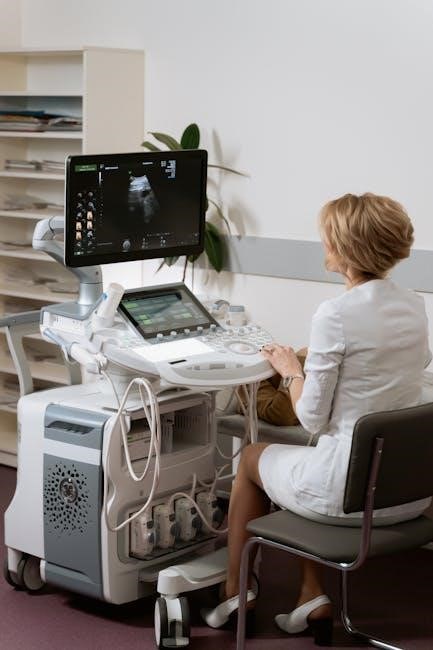The Denver Screening Test is a trusted tool for assessing developmental milestones in children, focusing on physical, language, and cognitive growth. It helps identify potential delays early.
Overview of the Denver Screening Test
The Denver Screening Test is a widely used developmental assessment tool designed to identify potential delays in children’s growth. It evaluates key areas such as physical, language, and cognitive development. The test is non-invasive and typically administered by trained professionals. Results are categorized as normal, suspect, or untestable, providing clear insights for further intervention. The Denver II is the latest version, offering refined criteria for accurate screening. It is applicable for children from birth to six years, making it a valuable resource for early childhood development monitoring. Proper training is essential for administrators to ensure reliable outcomes.
Importance of Developmental Screening in Early Childhood
Developmental screening in early childhood is crucial for identifying delays and ensuring timely interventions. Early detection of issues in physical, language, or cognitive development can significantly improve long-term outcomes for children. Tools like the Denver Screening Test provide insights into a child’s progress, enabling parents and professionals to address concerns promptly. Screening also helps in monitoring developmental milestones, ensuring children receive appropriate support during critical growth periods. By facilitating early intervention, developmental screening plays a vital role in promoting healthy growth and enhancing the quality of life for children, making it an essential component of pediatric care.
Historical Background of the Denver Screening Test
The Denver Screening Test was created in the late 20th century as a tool to identify developmental delays in infants and young children. It evolved from the Denver Developmental Screening Test (DDST), developed by William K. Frankenburg, to the Denver II, enhancing reliability and accessibility for widespread use. The test has since become a cornerstone in pediatric care, aiding in the early detection of developmental issues and ensuring timely interventions for children.
Development of the Denver Developmental Screening Test (DDST)
The Denver Developmental Screening Test (DDST) was originally developed in the mid-20th century by Dr. William K. Frankenburg and colleagues. It aimed to provide a simple, effective method for early identification of developmental delays in children. The test focused on key milestones in physical, language, and cognitive development. Drawing from clinical observations and research, the DDST was designed to be administered by healthcare professionals during routine check-ups. Its creation marked a significant advancement in pediatric care, offering a standardized approach to developmental assessment and paving the way for its successor, the Denver II Screening Test.
Evolution of the Denver II Screening Test
The Denver II Screening Test evolved from the original DDST, incorporating updated norms and items to enhance accuracy and cultural sensitivity. It retained the core focus on assessing physical, language, and cognitive milestones but expanded age ranges and added more detailed developmental indicators. The Denver II also introduced new tools, such as the Denver Prescreening Developmental Questionnaire (PDQ), to aid in early detection of delays. These updates ensure the test remains a reliable and comprehensive tool for identifying developmental challenges, promoting timely interventions. Continuous revisions have kept the Denver II aligned with current research and clinical practices, improving its effectiveness in diverse settings.

Key Features of the Denver Screening Test
The Denver Screening Test offers a comprehensive assessment of developmental milestones, including physical, language, and cognitive skills. It provides clear, standardized criteria for evaluating children’s progress efficiently.
Structure and Components of the Denver II Test
The Denver II Test is structured into five key domains: Personal-Social, Fine Motor, Language, Gross Motor, and Cognitive. Each domain contains age-specific tasks to assess developmental milestones. The test includes visual aids and detailed instructions for administrators. It also provides normative data for comparison, ensuring standardized evaluation. The test materials are designed to be user-friendly, with clear scoring guidelines and interpretation criteria. This structured approach ensures comprehensive and reliable assessment of a child’s developmental status, aiding in early identification of potential delays or disorders.
Age Range and Applicability of the Test
The Denver II Screening Test is designed for children aged 0 to 6 years, making it suitable for early childhood developmental assessment. It is widely applicable in clinical, educational, and home settings, providing a reliable tool for identifying potential delays. The test can be administered by trained professionals, including pediatricians, educators, and therapists. Its versatility allows it to be used for diverse populations, though cultural and linguistic adaptations may be necessary. The Denver II is particularly valued for its ability to detect early signs of developmental challenges, enabling timely interventions and support for children.

Administration of the Denver Screening Test
The Denver Screening Test requires trained administrators to assess children’s developmental milestones effectively. The process involves observing and engaging the child through standardized tasks and activities to evaluate their physical, cognitive, and language abilities. Proper preparation, including gathering necessary materials and ensuring a conducive environment, is essential for accurate results. The test is typically administered in a clinical or educational setting, with the administrator following a structured protocol to ensure consistency and reliability. This standardized approach helps in identifying potential developmental delays and ensuring timely interventions. The test’s administration is straightforward but requires attention to detail to maintain its validity and effectiveness in assessing young children’s developmental progress.
Preparation and Setup for the Test
Preparation for the Denver Screening Test involves gathering necessary materials, such as the test forms, manuals, and age-appropriate toys. Ensure a quiet, child-friendly environment with minimal distractions. Review the child’s developmental history and any prior test results. Familiarize yourself with the test instructions and ensure all materials are organized. Administering the test requires a trained professional to engage the child and accurately assess their abilities. Proper setup includes arranging toys and tools to encourage natural interaction, allowing for an accurate evaluation of developmental milestones. Thorough preparation ensures a smooth and effective testing process.
Step-by-Step Administration Process
The Denver Screening Test begins with establishing rapport to make the child comfortable. The administrator presents tasks in a standardized order, observing and recording responses. For infants, this includes assessing reflexes and motor skills, while older children engage in problem-solving and language tasks. Each item is scored as “pass,” “fail,” or “no opportunity to observe.” The process is interactive, with toys and prompts used to elicit responses. Timing is crucial, ensuring tasks are age-appropriate and administered without rushing. The administrator documents all observations meticulously, adhering to test protocols to ensure reliability and accuracy in assessing developmental milestones.

Interpretation of Test Results
Test results categorize each item as normal, suspect, or un-testable. The number of items in each category determines if developmental milestones are met or if further evaluation is needed.
Understanding Normal, Suspect, and Un-testable Outcomes
The Denver Screening Test categorizes results into three outcomes: normal, suspect, and un-testable. A normal outcome indicates typical development, while suspect suggests potential delays requiring further evaluation. Un-testable results occur when a child cannot complete the test due to behavioral or developmental challenges. Each item is scored based on the child’s ability to perform tasks, with results compared to age-specific norms. Accurate interpretation ensures appropriate interventions for children with suspected delays, making it a vital tool for early identification and support. Proper training is essential for administrators to correctly classify and interpret these outcomes effectively.
Passing the Proficiency Examination for Test Administrators
Passing the proficiency examination for the Denver Screening Test is essential for administrators to ensure accurate and reliable results. The exam assesses the administrator’s ability to correctly interpret test items, score responses, and classify outcomes as normal, suspect, or un-testable. Proper training and understanding of the test’s structure are critical. The examination typically includes both theoretical and practical components, such as demonstrating proficiency in test administration and scoring. Successful completion ensures that administrators can effectively identify developmental delays and provide appropriate referrals for intervention, making it a cornerstone of professional competence in using the Denver II Test.

Developmental Milestones Assessed by the Test
The Denver Screening Test evaluates key developmental milestones, including physical, language, and cognitive abilities, ensuring early detection of potential delays in children’s growth and development patterns.
Physical and Motor Development Milestones
The Denver Screening Test assesses physical and motor development milestones, such as sitting, standing, walking, and coordination. It evaluates gross motor skills like running and jumping, as well as fine motor abilities, including drawing and using objects. The test also examines hand-eye coordination and balance, ensuring children meet expected benchmarks for their age. By identifying delays in motor development, early interventions can be implemented to support physical growth and overall well-being. This section focuses on the specific motor skills evaluated, providing a clear understanding of the test’s scope in assessing physical development in early childhood.
Language and Communication Development Milestones
The Denver Screening Test evaluates language and communication skills, including vocabulary, sentence structure, and comprehension. It assesses verbal and non-verbal abilities, such as babbling in infants and complex speech in older children. The test also measures listening skills, response to commands, and the ability to communicate needs effectively. Early identification of delays in language development can prompt timely interventions, ensuring children meet age-appropriate communication milestones. This section details the specific language skills assessed, highlighting the test’s role in monitoring and supporting linguistic growth during critical developmental stages.
Cognitive and Social-Emotional Development Milestones
The Denver Screening Test assesses cognitive abilities such as problem-solving, memory, and understanding cause-effect relationships. It also evaluates social-emotional skills, including self-awareness, emotional regulation, and interpersonal interactions. The test identifies milestones like imitation, sharing, and cooperation, reflecting a child’s ability to interact with others. By monitoring these areas, the test helps detect delays in cognitive or social-emotional growth, enabling early intervention. This section emphasizes the importance of these milestones in shaping a child’s overall developmental trajectory, ensuring they meet age-appropriate expectations for thinking, reasoning, and social behaviors.

Tools and Resources for the Denver Screening Test
The Denver Screening Test provides key resources such as Denver Developmental Materials, Inc. (DDM, Inc.), offering Denver II forms, and the Denver Prescreening Developmental Questionnaire (PDQ) for early assessment.
Denver Developmental Materials, Inc. (DDM, Inc.)
Denver Developmental Materials, Inc. (DDM, Inc.) is the official provider of Denver Screening Test materials. They offer Denver II forms, training manuals, and resources for administering the test. DDM, Inc. ensures professionals have access to validated tools for assessing developmental milestones. Their materials include detailed instructions for test administration and interpretation. Additionally, they provide support for training programs, enabling professionals to become certified in using the Denver II test effectively. DDM, Inc. also offers resources like the Denver Prescreening Developmental Questionnaire (PDQ) for early identification of developmental concerns. Their contact information is available for ordering materials and accessing support.
Denver Prescreening Developmental Questionnaire (PDQ)
The Denver Prescreening Developmental Questionnaire (PDQ) is a complementary tool to the Denver Screening Test, designed for early identification of developmental concerns. It is a parent-completed questionnaire that assesses a child’s developmental milestones across physical, language, and cognitive domains. The PDQ is recommended for children aged 0-9 years and serves as a preliminary screening before administering the Denver II test. It helps identify children who may benefit from a more comprehensive evaluation. The PDQ is available in PDF format, making it accessible for professionals and parents to use in various settings. Its streamlined design ensures efficient and effective screening.
Denver II Developmental Screening Test Forms and Catalog
The Denver II Developmental Screening Test offers comprehensive forms and a detailed catalog to facilitate its administration. These resources include standardized test forms, scoring guidelines, and interpretation manuals. The catalog provides essential materials for assessors, ensuring accurate evaluation of developmental milestones. Available in PDF formats, these documents are accessible and user-friendly. They are distributed by Denver Developmental Materials, Inc. (DDM, Inc.), ensuring quality and consistency. The forms and catalog are indispensable tools for professionals conducting the Denver II test, aiding in early detection of developmental delays and guiding appropriate interventions for children.
Comparison with Other Developmental Screening Tools
The Denver Screening Test is often compared to the Bayley Scales of Infant Development (BSID) and the M-CHAT for assessing developmental milestones. Each tool has unique strengths and focuses, with the Denver II emphasizing early detection of delays in a broader age range.
Bayley Scales of Infant Development (BSID)
The Bayley Scales of Infant Development (BSID) are a comprehensive assessment tool for evaluating developmental milestones in infants and young children. Unlike the Denver Screening Test, the BSID focuses on five key domains: cognitive, motor, language, social-emotional, and adaptive development. It is designed for children aged 1 to 42 months, providing in-depth insights into developmental progress. While the Denver II is a screening tool, the BSID is more detailed, often used for diagnostic purposes. Both tools are widely recognized but serve different purposes, with the BSID offering a deeper understanding of developmental strengths and challenges in early childhood.
M-CHAT (Modified Checklist for Autism in Toddlers)
The M-CHAT is a widely used screening tool for detecting early signs of autism in toddlers aged 16 to 30 months. It consists of 23 questions assessing social, communication, and behavioral development. Unlike the Denver Screening Test, which evaluates a broader range of developmental areas, the M-CHAT focuses specifically on autism-related traits. Parents complete the checklist, and results are interpreted by professionals. It is often used alongside other tools like the Denver II for a comprehensive assessment. Early identification through M-CHAT can lead to timely interventions, improving developmental outcomes for children at risk of autism spectrum disorder.
Criticisms and Limitations of the Denver Screening Test
The Denver Screening Test faces criticism for cultural and linguistic biases, potentially leading to inaccurate results in diverse populations. Its reliance on standardized norms may not account for individual variations or environmental factors, limiting its applicability in non-Western or multilingual settings. Additionally, the test’s interpretation requires skilled administrators, which can be a barrier in regions with limited resources or trained professionals. These limitations highlight the need for careful consideration when using the Denver II in heterogeneous populations and the importance of supplementing it with other assessment tools to ensure comprehensive evaluation.
Common Criticisms of the Denver II Test
The Denver II Test has faced criticism for its cultural and linguistic biases, potentially leading to inaccurate results in diverse populations. Its reliance on standardized norms may not account for individual variations or environmental factors, limiting its applicability in non-Western or multilingual settings. Additionally, the test’s interpretation requires skilled administrators, which can be a barrier in regions with limited resources or trained professionals. These limitations highlight the need for careful consideration when using the Denver II in heterogeneous populations and the importance of supplementing it with other assessment tools to ensure comprehensive evaluation.
Limitations in Diverse Cultural and Linguistic Settings
The Denver II Test faces challenges in culturally and linguistically diverse settings due to its standardized norms primarily based on Western populations. This may result in biased outcomes for children from non-Western backgrounds, as cultural differences in developmental expectations and language exposure are not adequately accounted for. Additionally, the test’s reliance on specific linguistic cues can disadvantage non-English speaking children, potentially leading to incorrect classifications of developmental delays. These limitations underscore the need for culturally sensitive adaptations or supplementary assessments to ensure accurate and fair evaluation of all children, regardless of their cultural or linguistic background.

Case Studies and Practical Applications
The Denver Screening Test is widely used in clinical settings to assess children’s developmental progress. A case study involving a boy assessed at 1 year and 10 months demonstrated its effectiveness in identifying psycho-motor development delays, providing actionable insights for early intervention.
Using the Denver Test to Assess Psycho-Motor Development in Children
The Denver Screening Test is a valuable tool for evaluating psycho-motor development in children, focusing on age-specific milestones such as sitting, standing, and walking. It assesses both gross and fine motor skills, providing insights into a child’s physical growth. A case study involving a boy aged 1 year and 10 months highlighted the test’s effectiveness in identifying delays in psycho-motor development. The test’s structured approach ensures reliable results, aiding healthcare professionals in early intervention strategies. Its applicability spans from infancy to early childhood, making it a cornerstone in developmental assessments and supporting tailored therapeutic plans for children with identified delays.
Real-World Examples of Test Implementation
The Denver Screening Test has been widely implemented in clinical and educational settings to assess children’s developmental progress. For instance, a case study used the Denver II Test to evaluate a boy’s psycho-motor development at 1 year and 10 months, providing clear insights into his physical growth. Additionally, the test is often used in early childhood programs to identify delays in motor skills, language, and cognitive abilities. Its practical application is evident in routine developmental screenings, where it helps professionals intervene early to support children’s holistic development. These real-world examples highlight the test’s effectiveness in diverse settings, ensuring timely and targeted interventions for children.

Training and Certification for Test Administrators
Administering the Denver Screening Test requires specialized training and certification, ensuring accurate assessment of children’s developmental milestones. Professionals must pass a proficiency examination to qualify.
Requirements for Administering the Denver II Test
Administering the Denver II Test requires specific qualifications. Test administrators must complete training programs approved by Denver Developmental Materials, Inc.. They must also pass a proficiency exam to ensure accuracy and reliability in test administration. Additionally, administrators are expected to maintain updated knowledge of developmental milestones and screening techniques. Proper training ensures that results are interpreted correctly, providing reliable insights into a child’s developmental status. These requirements help maintain the test’s validity and effectiveness in early childhood assessments.
Professional Development Opportunities for Test Administrators
Professional development for Denver II Test administrators includes specialized training programs and workshops. These opportunities, often provided by Denver Developmental Materials, Inc., ensure administrators stay updated on best practices. Continuing education courses focus on improving assessment skills and understanding developmental milestones. Additionally, resources like the Denver Prescreening Developmental Questionnaire and online workshops enhance administrators’ expertise. These opportunities are crucial for maintaining proficiency and ensuring accurate test administration. By engaging in ongoing learning, administrators can effectively identify developmental delays and support early interventions, ultimately benefiting children’s long-term growth and development.

Legal and Ethical Considerations
Administering the Denver Screening Test requires adherence to legal and ethical standards. Confidentiality of results and informed consent are critical to ensure privacy and trust in the process.
Privacy and Confidentiality in Test Administration
Privacy and confidentiality are paramount when administering the Denver Screening Test. Test results, including PDF documents, must be securely stored to protect sensitive information. Administrators must ensure compliance with legal standards like HIPAA to safeguard children’s and families’ data. Informed consent is essential, and parents/guardians must be aware of how results will be used. Confidentiality agreements and secure digital platforms are recommended to prevent unauthorized access. Proper training ensures administrators understand their ethical and legal obligations in maintaining privacy throughout the screening process.
Ethical Use of Screening Results for Intervention
The ethical use of Denver Screening Test results ensures interventions are tailored to a child’s needs. Results must not be misused or shared without consent. Administrators should avoid labeling children and focus on providing support. Parents/guardians must be fully informed and involved in decision-making. The test’s outcomes should guide evidence-based interventions, ensuring timely and appropriate support. Cultural sensitivity is crucial when interpreting results and planning interventions. Ethical practices also involve respecting families’ values and ensuring interventions are accessible and equitable. Proper training and adherence to professional standards are essential to uphold ethical guidelines when using the Denver II for intervention purposes.

Future Directions and Updates
Future updates may include digital integration and cultural adaptations. The Denver Screening Test could expand accessibility and improve early detection of developmental delays in diverse populations globally.
Advancements in Developmental Screening Methods
Recent advancements in developmental screening methods include the integration of digital tools and AI-driven analyses. The Denver Screening Test is being adapted for online platforms, enabling remote assessments and broader accessibility. AI algorithms can now interpret test results more accurately, reducing human error. Additionally, the test is being refined to incorporate cultural and linguistic diversity, ensuring equitable screening for all children. Telehealth platforms are also being integrated to facilitate remote administration, making it easier for parents and professionals to identify developmental delays early. These innovations aim to enhance the test’s effectiveness and reach in modern healthcare settings.
Potential Revisions to the Denver Screening Test
Potential revisions to the Denver Screening Test aim to enhance its accuracy and applicability. Updates may include expanded cultural and linguistic adaptations to better serve diverse populations. Digital integration could allow for online administration and real-time results analysis. There is also consideration for refining age-specific milestones to reflect contemporary developmental psychology research. Additionally, the test may incorporate new assessment tools to evaluate emerging developmental domains, such as social-emotional growth. These revisions would ensure the test remains a reliable and comprehensive screening tool for early childhood development in an evolving healthcare landscape.
Resources for Further Reading
Explore the Denver Screening Test PDF guides and manuals for detailed insights. Additional resources include academic articles, online courses, and workshops offering in-depth training and updates.
Recommended Literature on Developmental Screening
Key literature includes the Denver II Developmental Screening Test manual, offering in-depth guidance on administration and interpretation. The Denver Prescreening Developmental Questionnaire (PDQ) provides insights into early detection of delays. Additional resources such as the HealthCheck Provider Manual and academic articles on developmental milestones are essential. The Bayley Scales of Infant Development complement the Denver Test with comprehensive assessments. For practical tools, explore the Denver Developmental Materials, Inc. (DDM, Inc.) catalog. These resources ensure a well-rounded understanding of developmental screening, aiding professionals in early intervention and support for children.
Online Courses and Workshops on the Denver Test
Online courses and workshops on the Denver Screening Test are available through platforms like Denver Developmental Materials, Inc. (DDM, Inc.). These programs offer training on administering the Denver II Test, interpreting results, and understanding developmental milestones. Many courses include interactive modules, case studies, and certification opportunities. The HealthCheck Provider Manual and academic articles provide additional resources for professionals. These workshops are designed for educators, healthcare providers, and researchers, ensuring they are equipped to use the Denver Test effectively in identifying developmental delays and supporting early intervention strategies.


